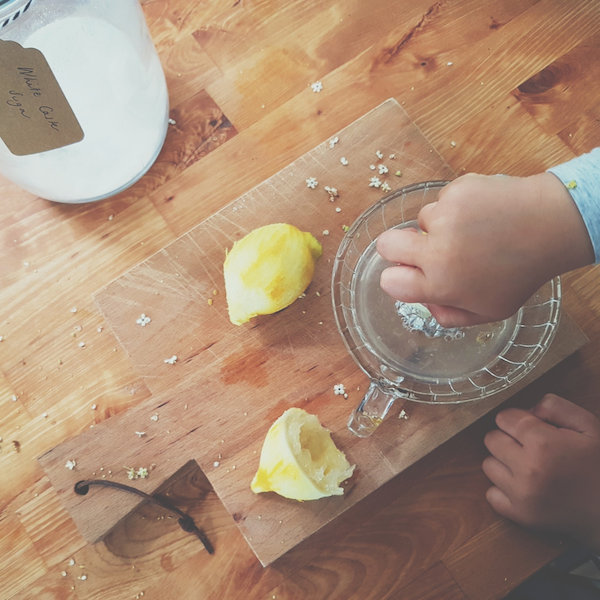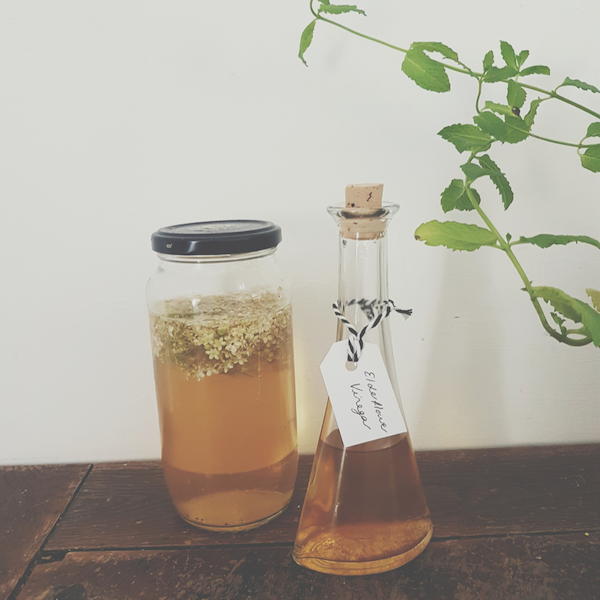
Elderflowers: found on the Elder tree in late spring/early summer
From late May and throughout June we can enjoy the heady scent of elderflowers, but we only have a short window of opportunity to make our favourite infused products including gin, cordial, vinegar and champagne!
Our team have been out foraging in their gardens and hedgerows to gather ingredients to make their favourite seasonal produce. Once you get your 'eye in' it will be easy to spot the fluffy heads of elderflowers and they are very easy to identify correctly because of their strong, distinctive scent. Please don't be tempted to strip the trees though - it is important to leave some for local wildlife and ensure good future growth.
Here are Alex's tried and tested recipes:
Elderflower cordial
Our little ones love elderflower cordial so it is great to involve them in finding and picking elderflowers and helping to concoct it!
 Squeezing lemons
Squeezing lemons
 Stirring the 'potion'
Stirring the 'potion'
Ingredients:
- 1 litre boiling water
- 2 litres of cold water
- 900g of white sugar (granulated or caster)
- 50g citric acid (optional)
- 2 unwaxed lemons
- 25 elderflower heads (brushed/shaken off to remove insects)
You can buy citric acid in a range of places, such as Wilkinsons, Amazon and some chemists.
You could also add 2 Campden tablets to extend the shelf life and enable you to store indefinitely, but be careful when using them as they can emit irritant gas - so do not inhale when adding. Add at the same time as the citric acid.
Method:
- Put the sugar in a bucket and pour over the boiling water, stir to dissolve the sugar
- Add the cold water to speed up the cooling process.
- Add the citric acid (job for an adult)
- Squeeze the lemons then slice up the remaining skin and pith thinly, add to the bucket
- Add the elderflowers and stir everything up together
- Cover the bucket with a tea towel and leave to steep for 1 day, stirring occasionally
- Strain through a muslin cloth and pour into sterilised bottles
- Keeps for 3-4 months in the fridge (without Citric Acid it will keep for 3-4 weeks in the fridge). You can add Campden tablets to keep it for a much (much, much) longer period in a cool dark place.
Elderflower vinegar
I absolutely love the taste of elderflowers and wanted to find ways to capture the beautiful floral aroma and taste in more ways, so last year I did some experiments with infused vinegars: adding lime and ginger and using different types of vinegar. My favourite was the small sample I did of elderflower combined with white wine vinegar - we all loved it. Shame I had to wait a whole year to make another batch!
Ingredients:
- 15 elderflower heads
- 500ml white wine vinegar (though cider vinegar is good too)
Method:
- Shake any bugs off the elderflowers (do not wash them)
- Remove the flowers from the stalks and add them into a large jar (big enough to hold all of the ingredients)
- Add the vinegar and lid of the jar
- Give it a shake and leave for 10 days in a cool, dark place, shaking occasionally
- Strain through a muslin and store in sterilised jars or bottles
- Will keep for at least a year!
 Elderflowers and finished vinegar
Elderflowers and finished vinegar
 Elderflowers infusing into vinegar
Elderflowers infusing into vinegar
Rhubarb & Elderflower Gin
Combining two of my favourite flavours: rhubarb freshly plucked from my parents' veg patch and more heady elderflowers. I hear that rhubarb is a great source of vitamin K. I am not sure it counts in this form, but I like to think it is mildly nutritional!
I tried a few recipe variations last year, all were delicious, but this was my favourite (testing was tough though!)
 Rhubarb and elderflower gin ingredients
Rhubarb and elderflower gin ingredients
 Gin brewing in kilner jar
Gin brewing in kilner jar
Ingredients:
- 1 litre of gin (any standard london dry gin works, don't go for anything that is already quite botanical or flavoured)
- 2 tbsp white caster sugar
- 8 elderflower heads (bugs shaken off)
- 4 large stalks of rhubarb
- 1.5 - 2 litre kilner jar - sterilsed
Method:
- Chop the rhubarb stalks into chunks and add to jar
- Remove flowers from the main stem of the elderflower heads and also add to the jar
- Pour in the gin
- Stir in the sugar
- Leave to brew for 4 weeks in a cool dark place, shaking from time to time to ensure the sugar mixes in
- Strain through a muslin and decant into sterilised bottles
- Can be served on its own over ice, topped with soda water and a wedge of lime or in various cocktails!
Elderflower Champagne

Elderflower champagne in the fermentation stage
And if these were not enough to be getting on with, why not check out our great elderflower champagne recipe>
Here's mine currently a week in and lots of lovely bubbles popping up. It smells fantastic even though it doesn't look that appetising.
A few more days to go until bottling, followed by a week in the fridge.
Can't wait!
If you enjoyed reading this please take a look at these foraging articles and recipes>



